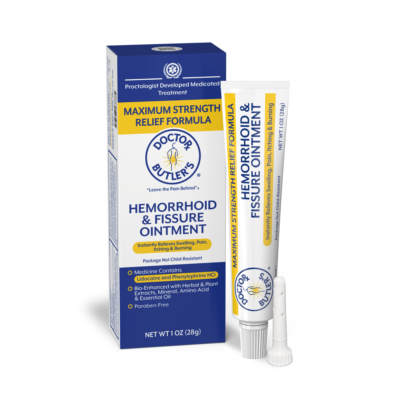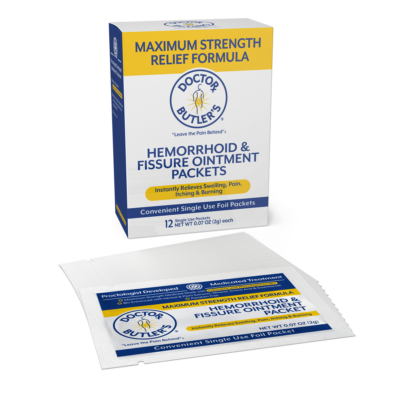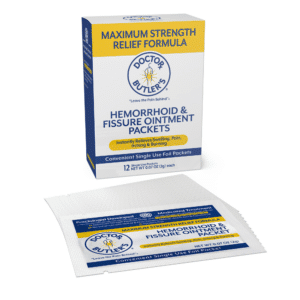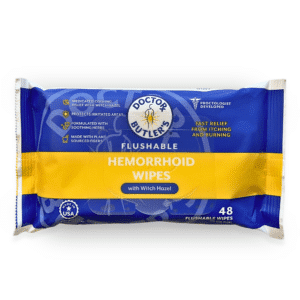Being afraid of a painful trip to the toilet is no fun. A squeaky wheel, however, gets the grease, and because about half of all people will deal with itchy or burning hemorrhoids at some point in their life, there’s actually a lot of research that has been done to treat problematic hemorrhoids. Now, you get to benefit from that!
So, if you have questions about how to poop with a hemorrhoid, know that they have been asked many times before. As a proctologist, I’ve spent more than 30 years answering these and other burning (figuratively and literally) questions from my patients.
The tips in this post should guide you to immediate relief and ideally towards painless trips to the toilet in the future.
Who are we? We’re Doctor Butler’s, experts in down-there care of hemorrhoids and related conditions. We make proctologist-developed hemorrhoid ointments and complementary products to help you quickly leave the pain behind. Dr. Robert Cutler medically reviews all of the information here.
This post was originally published March 12, 2021 and has been updated to include specific diet tips for hemorrhoids sufferers.
Does Pooping with a Hemorrhoid Hurt?
Pain in the butt while going to the bathroom? It’s possible you are having a hemorrhoid flare up. While the physical pain may concern you, you can take comfort in the fact that symptomatic hemorrhoids are incredibly common and that there are some pretty simple ways to treat them.
Problem hemorrhoids are blood vessels that have become irritated. Once they are irritated, and you continue to provoke them during bowel movements, they become more and more of a problem.
Pain ease
No burning . . stays put good solid product for easing pain of private area.
Verified ReviewerInternal Hemorrhoids Vs. External Hemorrhoids
Before we get to treatments and nonsurgical therapies for immediate and near-term hemorrhoid pain, let’s learn a bit about what hemorrhoids are and why they become a problem.
Everyone has hemorrhoids; they are a normal part of human anatomy. Not everybody has symptomatic or problem hemorrhoids, which cause pain, itching or burning. Internal hemorrhoids are on the inside of your anal cavity and external hemorrhoids are on the surface of your skin. Both are simply blood vessels.
Most of the time internal and external hemorrhoids are not symptomatic. Research shows that about 50 percent of people will have symptomatic (painful, protruding, itchy, bleeding, etc.) internal or external hemorrhoids at some point in their life.
Hemorrhoids sometimes get irritated through your diet. Consuming too much of a spicy food, for example, not enough fiber or dehydration. They can also get irritated by stress, which causes gastrointestinal problems and irregular bowel movements. Not getting enough exercise, doing exercises that put too much pressure on your backside or sitting too long can also be causes, along with obesity.
In short, there are many ways for hemorrhoids to become inflamed, and it’s important that you speak with your doctor if you notice that your hemorrhoids are becoming a regular problem for you. With your doctor and this guide, you should be able to prevent further development of symptomatic internal and/or external hemorrhoids.
Now that we have some background knowledge, we can learn how to poop with a hemorrhoid.
How Can I Relieve Hemorrhoid Pain During Bowel Movements?
First and foremost, prevention is the best way to avoid hemorrhoid pain. That could mean cutting back on dairy and increasing your intake of fiber, or it could mean managing your stress using therapies in a way so that it does not affect your gastrointestinal system.
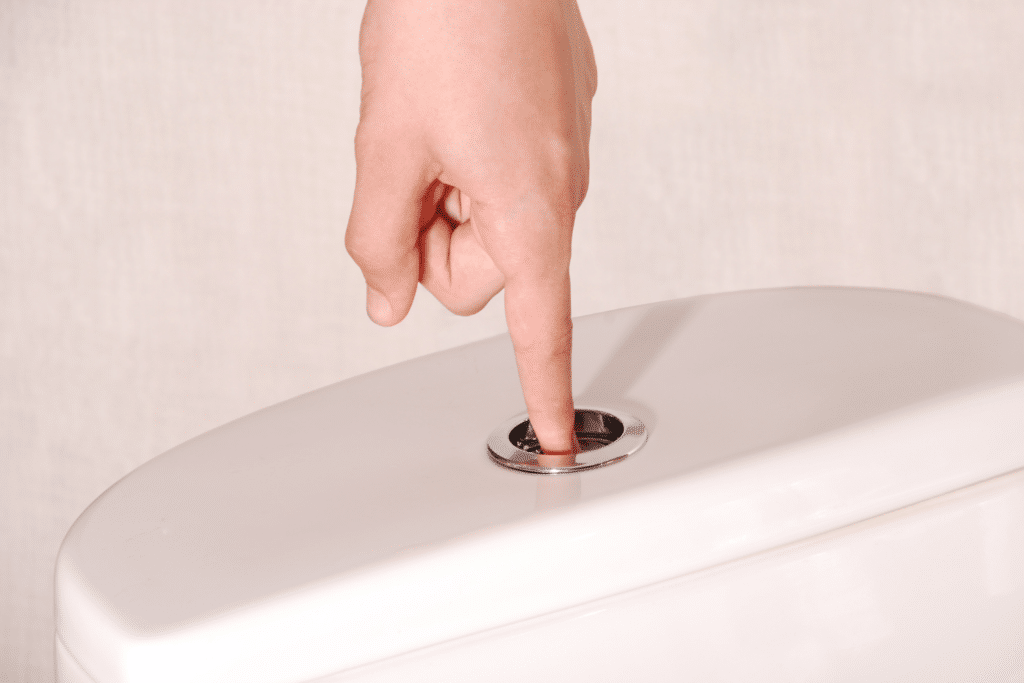
If you are prone to painful hemorrhoids, preventative methods are your best bet for future pain-free bowel movements. I’ve written about a high fiber diet for hemorrhoids and how stress affects your body in the past, and you may want to check those posts out.
If you’re dealing with hemorrhoids right this very moment, however, you’ll be happy to know there are some treatment methods to bring you immediate or near term relief.
- Strain less
- Over-The-Counter hemorrhoid creams
- Stool softeners
- Sitz Baths
- Go easy with the toilet paper
Dive into each of these treatments below, and see which are right for you. (Hint: you may want to try them all.)
Strain Less and Reduce Time on the Toilet
Straining on the toilet puts extra pressure on your hemorrhoids. Because hemorrhoids are protruded blood vessels, more pressure causes them to swell up and become primed for tears or irritation as a stool passes over them. Try a step stool to elevate your feet while sitting on the toilet; this change in position of the rectum helps for easier passage of stools.
Likewise, it’s easy to become distracted by a book or your phone while in the bathroom, but you may actually be causing problems by sitting on the toilet for a long time. As you sit, blood pools into the veins in your anorectal area, causing further stretching of protruded blood vessels, or hemorrhoids. If the blood vessel gets too big, it could break and cause bleeding.
That said, don’t delay bowel movements out of fear of straining or extended time on the toilet. Go to the bathroom when you feel the need, because delaying causes further harmful straining.
OTC Hemorrhoid Creams
A cream is likely your go-to for problem hemorrhoids. The main advantage of over the counter hemorrhoid creams is the use of a vasoconstrictor to shrink protruded blood vessels and decrease inflammation. This soothes the symptoms of hemorrhoids, such as irritation and burning.
Creams come in many different formulations. Find one that includes a strong pain reliever such as lidocaine, a vasoconstrictor such as phenylephrine and an astringent like Zinc Oxide which shrinks tissues to provide relief from irritation and burning, and also includes herbs, minerals, amino acids and essential oils to promote and support anorectal healing.
The relieving astringent works by counteracting the stimuli causing the uncomfortable symptoms, while the herbs, minerals, amino acids and essential oils heals your skin. You can both soothe your pain and heal your body with a hemorrhoid cream like Doctor Butler’s Hemorrhoid and Fissure Ointment.
Convenient
Perfect amount, easy to open.
Verified ReviewerStool Softeners
You don’t want to rely on stool softeners for hemorrhoids every time you have a flare up, but if you can use it to reduce your anxiety about the pain of having a hard bowel movement right now, use it. To make it easier to poop with hemorrhoids, we recommend instead to boost your fiber intake. This will naturally soften your stools when you have constipation and hemorrhoids.
Sitz Baths
A sitz bath is a basin that goes on top of the toilet seat. Alternatively, you can use your bathtub to soak in, but this is more effort than a special purpose sitz bath if you’re going to make soaking a regular part of your bowel movement routine.
A sitz bath is useful for soothing your bottom after going to the bathroom, without the use of excess toilet paper. Rubbing too hard with toilet paper can be irritating to inflamed hemorrhoids so you can avoid that with a sitz bath.
Additionally, you want to make sure your affected area is free of fecal matter. The leftover residue can be an irritant.
A popular sitz bath technique is to add some epsom salt to the water. Use a soothing bath salt (aka epsom salt) in combo with a sitz bath soak to speed up the healing process by increasing blood flow to your anorectal area.
End Your Restroom Visit with Natural Wet Wipes
Rubbing too hard with toilet paper can make a mild hemorrhoid problem worse, but it may be inconvenient to do sitz bath soak therapies after every bowel movement. It’s important, however, to avoid a lot of wiping because that process can irritate sensitive skin, and rough toilet paper does the most damage. Be sure to exercise as much care as possible, especially if you have a condition such as arthritis.
You may be considering a toilet wipe marketed specifically for problem hemorrhoids, and while it may sound counterintuitive, I actually recommend my patients to stay away from most medicated wipes. Many wipes contain chemicals that can further inflame hemorrhoids.
Hemorrhoid sufferers just need a consistent way to get the irritated area of the anus clean in order to apply an ointment or other treatment like a no-touch hemorrhoid spray. A chemical-free wipe like Doctor Butler’s soothing wipes are not medicated, and are soft enough for sensitive skin.
How Can I Poop Comfortably With a Hemorrhoid?
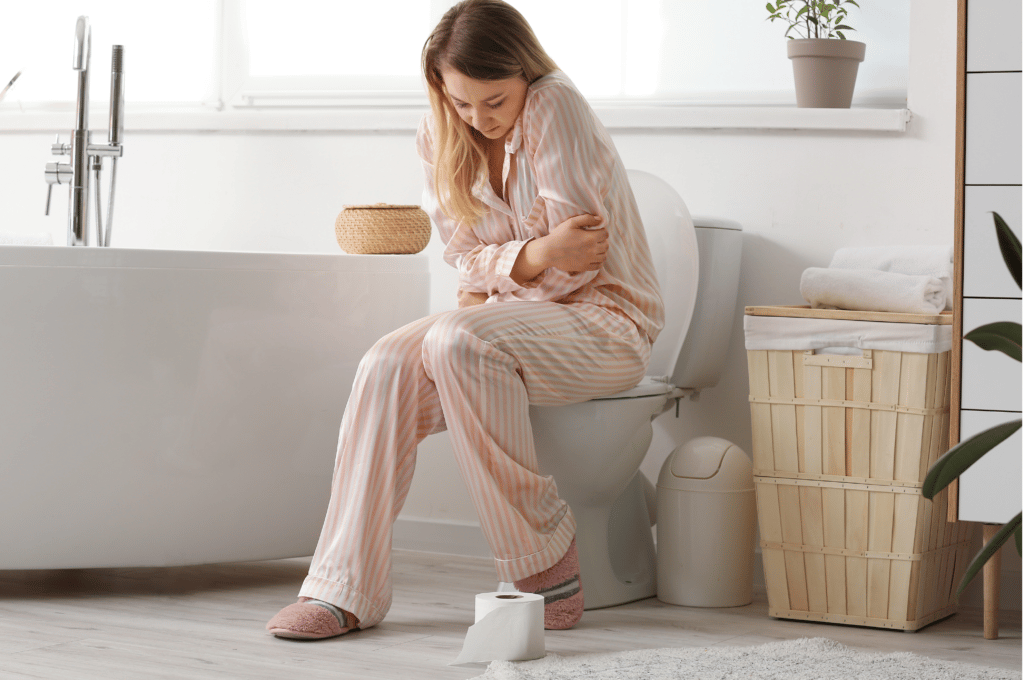
Ultimately, it may take a bit of patience and trying out multiple methods of relief before you can find what therapies work for you.
Just like the cases of many situations in the medical world, there may not always be a “one size fits all” approach for how to poop with hemorrhoids.
Factors such as diet, lifestyle, exercise and biology are all major guidelines in determining how to best approach your situation.
Hemorrhoids and Constipation: Prevention Is Key to Reducing Hemorrhoid Pain
Going to the bathroom shouldn’t cause anxiety or pain, but hemorrhoids can cause these problems. To counteract this, you should try some preventative steps to stop problem hemorrhoids from hurting you in the first place.
- Try mixing up your diet to include more vegetables and high-fiber foods. High fiber diets regulate your colon and reduce the frequency of bleeding hemorrhoids.
- Drink more water to keep your colon healthy and your stools naturally softer. This should make going to the bathroom a strain-free process, similar to simply sitting in a chair.
- If you happen to do exercise therapies like weightlifting that puts excess pressure on your backside, you should regulate your workouts to relieve some of that pressure.
Taking these steps now can help you stop worrying about how to poop with hemorrhoids. As we say at Doctor Butler’s: Leave the Pain Behind!
